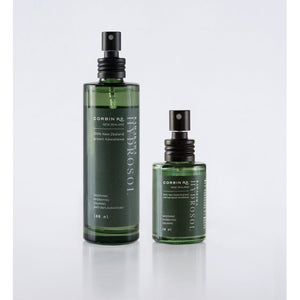Skin care is one of the most talked about topics in the world - and for good reason! It's an integral part of our health and overall wellbeing. So how does your gut play into this equation? The brain gut connection can determine whether you have healthy skin and if you suffer from any skin conditions like eczema or psoriasis.
Poor gut, poor skin
Poor gut, poor skin. Have you ever heard this phrase before? Probably not. It implies that there are two brains in your body and one of them is in your gut. Well, guess what? There are! And the second “brain” is very important when it comes to your skin health and appearance.
The gastrointestinal system (GI) processes food and converts it into energy, which then fuels every single cell in our body including our skin cells. Without proper nutrition coming from a healthy GI tract by eating enough vegetables or drinking enough water each day, we wouldn’t have enough energy to run around at top speed all day (and night) without getting tired or getting sickly pale undertones on our cheeks.
The brain gut connection
Have you ever ‘gone with your gut’ to make a decision or felt ‘butterflies in your stomach’? In those cases, you were getting signals from your second brain. The gastrointestinal tract is sensitive to emotions and feelings like anger, anxiety, sadness, happiness and others. As much as a worried brain can send signals to the gut, a troubled intestine can also send signals to the brain. That is because the gut and the brain are connected.
Not only do they share many of the same cells, chemicals and impulses, but they are both controlled by hormones from other parts of our bodies. These include insulin, leptin and ghrelin - all of which influence our moods and metabolism. These hormones can also impact skin health.
Skin is the largest organ in the body, and it needs to be fed
You're probably familiar with the skin being a major organ or "organ of defence". But did you know that it's also the largest organ in the body? It’s so large in fact that it accounts for about 20 percent of your total weight. That’s more than any other organ.
Skin is what keeps us safe from germs and injuries by acting as a first line of defence against external elements. It protects us from harmful UV rays, holds our body temperature steady and prevents dehydration by keeping moisture out. Skin also releases hormones like cortisol to signal stress levels (a good thing). It’s all pretty important stuff!
Gut friendly options - collagen, probiotics, fruit, veggies & a balanced diet
It's time to start incorporating some gut-friendly foods into your diet. These include:
- Collagen, which is the protein that makes up the connective tissue in the body. It's extracted from animals (most often cows) and can be found in bone broth or gelatine products.
- Probiotics, aka "good" bacteria that live in your gut and support your immune system, aid digestion and promote overall health. You can get them from yoghurt or fermented foods such as kimchi or kombucha.
- Fruits and vegetables are great sources of vitamins and minerals which are both essential nutrients for healthy skin. You should aim for five servings each day, but if you want to start small try one serving every day with lunch or dinner until you feel comfortable increasing it further. Just remember those calories still count even though they are good for us.
It can be beneficial to consult a nutritionist about how to feed your skin properly.
Take care of your skin with gentle skin care
Your skin is the largest organ in your body, which means that it needs to be fed. If your skin isn't optimal, try a gentle, high-quality skin care solution that uses organic ingredients to renew and protect dry and damaged skin.
It is important that we do not stress our skin with products that can irritate our delicate skin, causing it to become red, inflamed, irritated and dry. Some of the most common bad skin care habits include excess sun exposure, skipping sunscreen, sleeping with makeup on, smoking and drinking as well as touching and pricking your face.
Conclusion
So, there you have it! Skin is a big deal, but it can be managed with the right balance of good things. If your skin could do with some improvement, consult a nutritionist who can help you address your gut health as well as your diet and try a gentle but high-quality skin care solution like the complete skin care system from Corbin Rd for beautiful, glowing and resilient skin.


